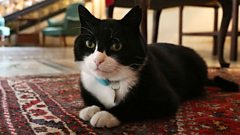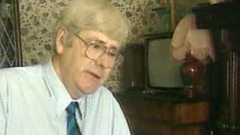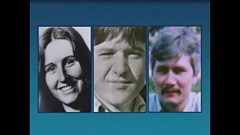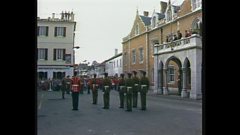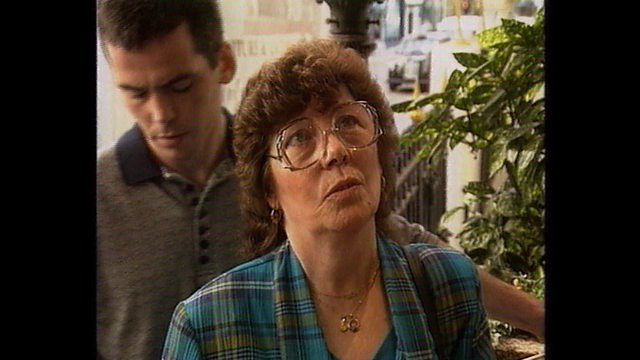
Anne Maguire attends Sir John Mayβs inquiry
Anne Maguire and her son Patrick attend Sir John Mayβs inquiry into the cases of the Guildford Four and the Maguire Seven.
Neil Bennett, the ΒιΆΉΤΌΕΔβs ΒιΆΉΤΌΕΔ Affairs Correspondent, reports on Anne and Patrick Maguireβs attendance at Sir John Mayβs inquiry into the cases of the Guildford Four and the Maguire Seven (please see context below).
On 20 October 1989, following the quashing of the Guildford Four convictions, May was appointed to chair an inquiry into that case and the related case of the Maguire Seven.
Over footage of Anne Maguire and her son Patrick arriving at the inquiry, Neil Bennett states: βAlthough her conviction has been quashed Mrs. Anne Maguire still doesnβt believe her name has been cleared.β Bennett explains that Mrs Maguire is hoping that Sir John Mayβs inquiry will succeed where the Court of Appeal Failed.
Sir John May is seen arriving at the inquiry, as is Peter Archer QC MP. Mr. Archer was the Labour Solicitor General when the Maguire Sevenβs case went to trial.
Sir Thomas Hetherington is also pictured. Sir Thomas worked in the office of the late Sam Silkin, the Attorney General, who had to sanction the prosecutions.
Sam Silkin is seen in archive footage; Neil Bennett reports that the inquiry was told he had doubts about the prosecutions.
Bennett informs us that David Clark QC, the independent counsel appointed by the May inquiry, said Mr. Silkin had realised how difficult it would be to prove the charge when no explosives were found in the Maguireβs house.
Mr. Silkin let the prosecutions go ahead when he was told that the scientific tests were 99% conclusive; but the inquiry heard that even the laboratory that carried the tests out now regarded them as fundamentally flawed.
CONTEXT
On 5 October 1974 the Provisional Irish Republican Army (PIRA) targeted Guildford, Surrey, because it was situated close to a number of garrison towns. The PIRA planted two six-pound gelignite bombs in two pubs. The first exploded just before 9.00pm in the Horse and Groom, destroying the front of the building and shattering the windows of neighbouring shops.
It killed Paul Craig, a plasterer (22 years old); two members of the Scots Guards, William Forsyth (18) and John Hunter (17); and two members of the Womenβs Royal Army Corps, Caroline Jean Slater (18) and Ann Ray Hamilton (19). A further sixty-five persons were wounded.
After the first explosion, other public houses were evacuated, including the Seven Stars where the second bomb exploded at approximately 9.35 pm without causing any serious injuries.
On November 7 1974 Gunner Richard Dunne, a soldier (42) and Alan Horsley, a sales clerk (20) were killed when a PIRA bomb exploded in the Kingβs Arms in Woolwich. Twenty-six people, including five soldiers, were injured.
In December 1974 the police arrested three men and a woman: Gerry Conlon, Paul Hill, Patrick Armstrong and Carole Richardson. In October 1975 these four were convicted of the Guildford and Woolwich bombings and given life sentences. The group was known as the Guildford Four.
On 4 March 1976 the Maguire Seven were convicted of making the explosives used in these bombings. The Maguire Seven were: - Anne Maguire, Patrick Maguire (Anneβs husband), Patrick Maguire (son of Anne and Patrick), Vincent Maguire (son of Anne and Patrick), Sean Smyth (brother of Anne), Patrick OβNeill (family friend) and Giuseppe Conlon (brother-in-law of Anne Maguire and father of Gerry Conlon).
Over the years, the cases of the Guildford Four and the Maguire Seven came under increasing legal scrutiny and the range of those seeking a review of the convictions extended widely. On 17 October 1989 it was announced that corruption proceedings would be taken against the police involved in the conviction of the Guildford Four. Two days later, with the exception of Paul Hill, those convicted for the bombings were released. This followed an announcement by the Director of Public Prosecutions that it would be wrong for the Crown βto seek to sustainβ the convictions of 1975 on the basis of confessions that were later retracted.
The Court of Appeal had decided that the DPP in 1975 had suppressed scientific evidence which conflicted with the confessions. Paul Hill remained in custody because he was implicated in a case that had not yet been resolved. His conviction was eventually quashed in April 1994.
On 26 June 1991 the Court of Appeal overturned the sentences on the Maguire Seven β all of whom had completed their sentences.
Afterwards many criticised the court for dismissing most of the grounds of appeal and for simply concluding that the hands of the convicted could have been innocently contaminated with nitro-glycerine.
Duration:
This clip is from
More clips from ΒιΆΉΤΌΕΔ Six O'Clock News
-
![]()
'He is not a European spy'
Duration: 01:42
-
![]()
Devastation in Omagh—17/08/1998
Duration: 01:53
-
![]()
Gibraltar victims named—07/03/1988
Duration: 01:16
-
![]()
Gibraltar's Changing of the Guard targeted—07/03/1988
Duration: 01:30

